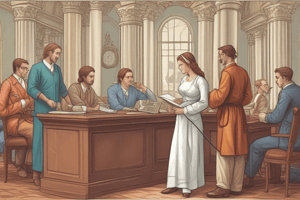Podcast
Questions and Answers
What is one key characteristic of law?
What is one key characteristic of law?
- It is fluid and changes frequently.
- It is only applicable to government officials.
- It is perceived as binding upon the community. (correct)
- It allows individuals to choose which regulations to follow.
According to the Mental Health Act 1983 section 2, what is a legitimate reason for the detention of a patient?
According to the Mental Health Act 1983 section 2, what is a legitimate reason for the detention of a patient?
- The patient is suffering from a mental disorder warranting hospital assessment. (correct)
- The patient shows disruptive behavior.
- The patient has committed a minor crime.
- The patient requires medication.
In the context of Nurse Jones's actions, which term best describes the moral implications of her keeping 6 cans for herself?
In the context of Nurse Jones's actions, which term best describes the moral implications of her keeping 6 cans for herself?
- Unlawful (correct)
- Mandatory
- Legal
- Ethical
What does the Old Norse origin of the word 'law' signify?
What does the Old Norse origin of the word 'law' signify?
Which of the following statements reflects a positive rule of law?
Which of the following statements reflects a positive rule of law?
What is a normative rule according to the content provided?
What is a normative rule according to the content provided?
Which of the following actions is legally mandated?
Which of the following actions is legally mandated?
What does semantic analysis of the phrase 'Woman without her man is lost' suggest?
What does semantic analysis of the phrase 'Woman without her man is lost' suggest?
What does secondary legislation refer to in the context of Acts passed by parliament?
What does secondary legislation refer to in the context of Acts passed by parliament?
What is the primary role of the judiciary in the governance of the UK?
What is the primary role of the judiciary in the governance of the UK?
How many judicial cases does the Supreme Court typically hear in a year?
How many judicial cases does the Supreme Court typically hear in a year?
Which of the following is an accurate statement regarding judicial interpretation of statutes?
Which of the following is an accurate statement regarding judicial interpretation of statutes?
What is stated about the Common Law system regarding precedent?
What is stated about the Common Law system regarding precedent?
In what context can Ultra Vires be challenged?
In what context can Ultra Vires be challenged?
Since which case have judges been allowed to use Hansard for interpretation in judicial functions?
Since which case have judges been allowed to use Hansard for interpretation in judicial functions?
What percentage of cases are heard by Magistrates in the UK?
What percentage of cases are heard by Magistrates in the UK?
What is the primary concern of the law of tort?
What is the primary concern of the law of tort?
Which type of legislation is primarily concerned with public matters and general classes of persons?
Which type of legislation is primarily concerned with public matters and general classes of persons?
What does the principle of coercion in legal authority imply?
What does the principle of coercion in legal authority imply?
What is one of the functions of Acts of Parliament?
What is one of the functions of Acts of Parliament?
Which of the following is considered a secondary source of law?
Which of the following is considered a secondary source of law?
What does 'social legislation' encompass?
What does 'social legislation' encompass?
How do proactive and reactive approaches differ in law-making?
How do proactive and reactive approaches differ in law-making?
In the context of healthcare ethics, what dilemma might arise with a patient's refusal of treatment?
In the context of healthcare ethics, what dilemma might arise with a patient's refusal of treatment?
Flashcards are hidden until you start studying
Study Notes
Law, Ethics and Nursing
- Key characteristics of law:
- Perceived as binding by the community
- Law is derived from the Old Norse word meaning “laid down or fixed”
- Normative rules are about actions to take (e.g. register a child’s birth)
- Positive rules are about actions to avoid (e.g. killing)
- R v Dudley & Stephens explored the necessity of killing and eating another person
- Healthcare needs to consider normative and positive rules
- When faced with ethical dilemmas, nurses need to consider a range of authorities, including legal ones
- Criminal law is about pursuing an action that is either acquitted or convicted as a crime
- Civil law is about seeking compensation for harm or preventing harm
- Sources of authority:
- For = Source
- Of = Weight
- Sources of law:
- Primary legislation (e.g. Acts of Parliament)
- Secondary legislation (e.g. Statutory Instruments)
- Judicial decisions (e.g. Supreme Court cases)
- Custom and practice (e.g. Highway Code)
- Received Wisdom (e.g. legal writers)
- Public Opinion (e.g. European Court)
- Extra-legal sources (e.g. Europe, ECHR)
- Acts of Parliament:
- Public General Acts are concerned with classes or subclasses (e.g. all nurses)
- Private Acts are concerned with specific localities or persons (e.g. a specific hospital)
- Function of Acts:
- Revision of substantive rules of law
- Consolidation of Acts
- Enactment of rules of common law
- Collection of revenue
- Social legislation
- Ways of making law:
- Bottom up (Proactive, policy driven)
- Top down (Reactive, problem-solving)
- Secondary legislation:
- Only 50 Acts are passed by Parliament each year
- Departments can pass secondary legislation (e.g. Statutory Instruments, Codes, Directives)
- Ultra Vires: acting beyond bestowed power can be challenged by judicial review
- Judicial interpretation of statutes:
- Relatively rare: Supreme Court only hears 70 cases a year
- Most of these cases are about interpretation of statutes
- Judges are the only ones who can interpret statutes
- Governance in the UK:
- Parliament (legislature) makes law
- Government (executive) implements the law
- Judiciary interprets the law, but does not act for the Crown
- Judicial function:
- To give force to the intention of Parliament as expressed in the Act
- To make decisions between disputing parties
- The courts:
- Supreme Court (12 Justices)
- Court of Appeal (32 Justices)
- High Court (92 Justices/Puisine Judges)
- Crown Court
- County Court
- Magistrates Courts
- Judicial decisions:
- The Common Law depends on precedent (Stare Decisis)
- A case is a precedent if it is analogous (similar)
- The principle of stare decisis means that a judicial decision must be followed in later similar cases.
- Legal writers can be used to interpret law, although they are not authoritative sources of law.
- The Highway Code is considered to be a good example of custom and practice.
- Parliament can pass new laws, but it can also delegate law-making powers to other bodies (e.g. government departments).
- The ECHR (European Court of Human Rights) is an example of an extra-legal source of law that is considered to be persuasive.
- Examples of social legislation include laws relating to health, education, and welfare.
- The Law Commission provides recommendations for legislation.
- Laws are often made as a response to a specific problem, for example, a new law being passed to address an increase in crime.
- Ultra vires means that an act or action is beyond the legal authority of the person or body that is taking it.
- It is important to note that the system of precedent is not rigid and that judges can deviate from precedent if they feel it is necessary.
- Hansard transcripts of parliamentary debates can be used to aid judges in interpreting statutes.
- The UK's governmental system of checks and balances involves Parliament, the government, and the Judiciary each having separate roles.
- Each branch of government plays a vital role in ensuring that laws are made effectively and fairly.
Studying That Suits You
Use AI to generate personalized quizzes and flashcards to suit your learning preferences.




